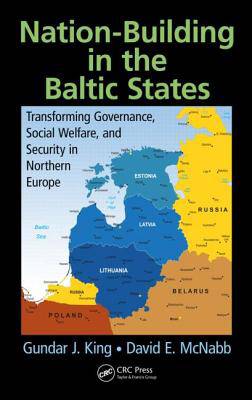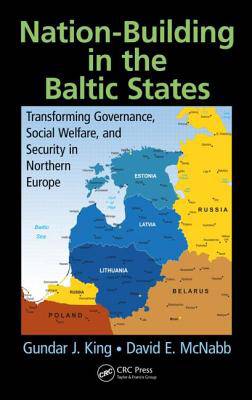
- Retrait gratuit dans votre magasin Club
- 7.000.000 titres dans notre catalogue
- Payer en toute sécurité
- Toujours un magasin près de chez vous
- Retrait gratuit dans votre magasin Club
- 7.000.0000 titres dans notre catalogue
- Payer en toute sécurité
- Toujours un magasin près de chez vous
Nation-Building in the Baltic States
Transforming Governance, Social Welfare, and Security in Northern Europe
Gundar J King, David E McNabbDescription
The product of more than twenty years of research, first-person observations, discussions, and policy analyses, Nation-Building in the Baltic States: Transforming Governance, Social Welfare, and Security in Northern Europe explores the characteristics of the Baltic states as positioned in the northeast corridor in terms of military strife and polity development such as democratization. It details governments' efforts to abet transparency and trust by way of developing new public and private institutions for advancements like innovation and private wealth creation.
The book examines the effects of various factors of economic and social adjustments in Estonia, Latvia, and Lithuania. The authors explore the opportunities and problems that have shaped the region's progress in the process of rebuilding democratic institutions and nation states after regaining their independence. They then describe the region's progress in laying the critical internal foundation necessary for maintaining their political independence. The book also reviews the progress made in strengthening what the authors believe are key social functions of government in what the EU describes as its social market system: the provision of social welfare services that meets the needs of all. The book concludes with a realistic picture of future hurdles for this region, looking at lingering challenges and regional instabilities, policy mistakes not to be made again, and recommendations for national planning and resource management.
Going beyond a massive, single explanation of recent Baltic developments, the book provides a broad picture of development of social and political trends and insights with separate evaluations of issues in the process of national transformation. It provides a foundation examining the forces that will shape the future of the Baltic states.
Spécifications
Parties prenantes
- Auteur(s) :
- Editeur:
Contenu
- Nombre de pages :
- 286
- Langue:
- Anglais
Caractéristiques
- EAN:
- 9781482250718
- Date de parution :
- 26-08-14
- Format:
- Livre relié
- Format numérique:
- Genaaid
- Dimensions :
- 155 mm x 234 mm
- Poids :
- 544 g

Les avis
Nous publions uniquement les avis qui respectent les conditions requises. Consultez nos conditions pour les avis.






